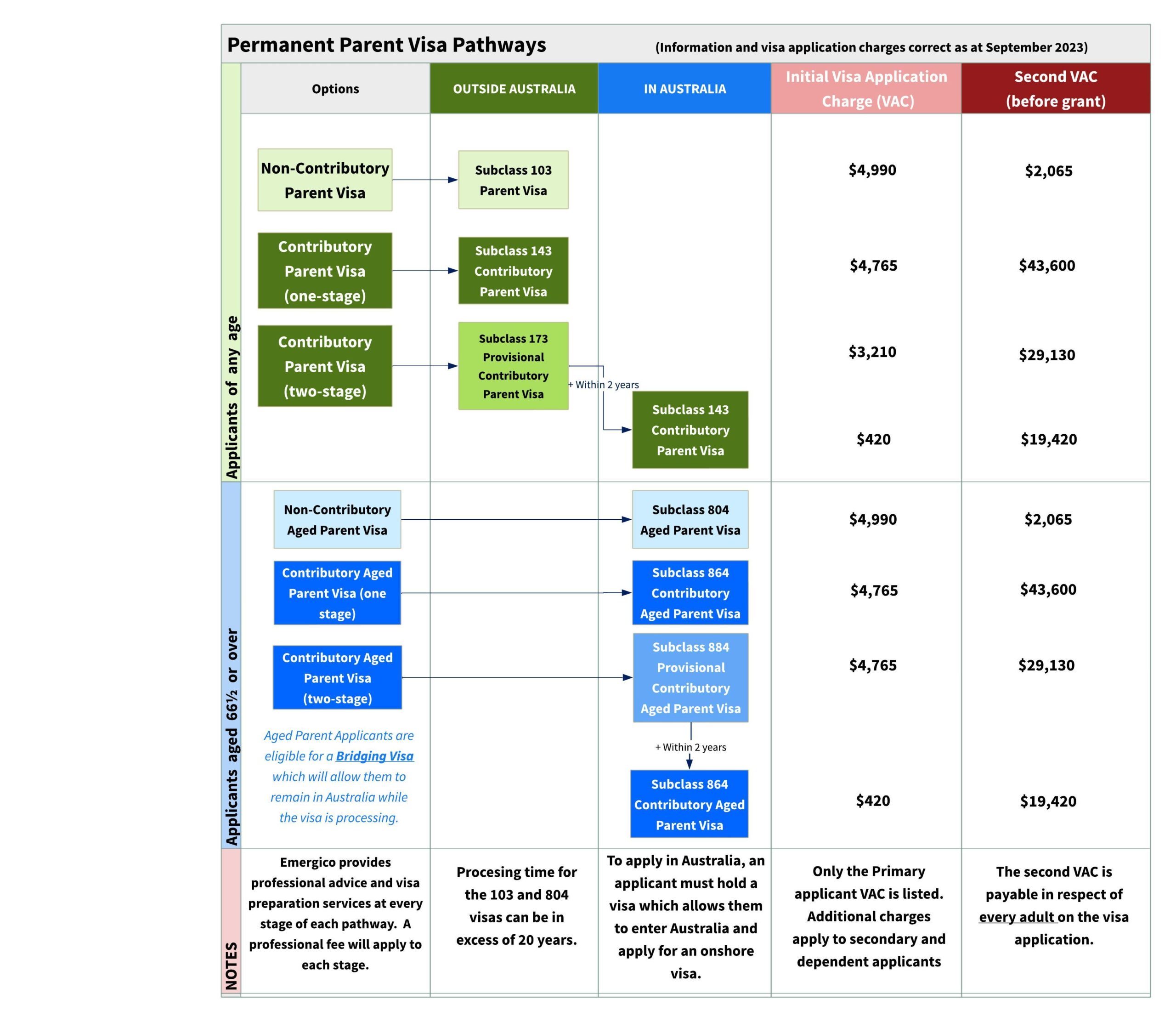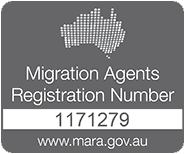Last updated: July 2023
PARENT VISAS
A fact sheet from Emergico Migration. Parents of settled Australian citizens and permanent residents may qualify for a Parent visa. There are several visa pathways.
This page will introduce you to Australia’s Permanent Parent Visa program.
Parents of settled Australian citizens and permanent residents may qualify for a Parent visa. There are several visa pathways.
This page will introduce you to Australia’s Permanent Parent Visa program.
Introduction
Permanent Parent visas can be expensive and take a long time to be granted. On a positive note, a permanent parent visa will give you unrestricted work, travel and study rights while in Australia. The Aged Parent Visas, for example, can be applied for while in Australia, and a Bridging Visa would be granted while the application is being processed.
There is also a Temporary Sponsored Parent Visa, which will allow parents of Australian citizens and permanent residents to enter Australia for 3 or 5 years, for a maximum of 10 years. You can read more about this visa subclass by clicking here.
Parent Visa Pathways
Below is a summary of the 6 different pathways, which vary depending on your age (under or over the age where you are eligible for the Aged Pension) and whether you wish to pay a large second stage payment to obtain your visa more quickly.

Eligibility for a Permanent Parent Visa
To make an application for a Permanent Parent Visa, you and your spouse must have more children living permanently in Australia than in any other country. This is called the ‘Balance of Family’ test (BOF). Your children (including step and adopted) are all counted in the BOF test if they are alive, even if they are estranged from you.
Below is a basic table that shows whether you’d meet the Balance of Family test with up to 4 children. It gets a little complicated if you have 3 children or more; and they all live in different countries, so best to have a proper assessment of whether you meet the BOF test, via a consultation with one of our team.
| How many children? | In Australia | Elsewhere | Meets BOF? |
|---|---|---|---|
| 1 | 1 | 0 | YES |
| 2 | 2 | 0 | YES |
| 2 | 1 | 1 | YES |
| 3 | 1 | 2 | NO |
| 3 | 2 | 1 | YES |
| 3 | 3 | 0 | YES |
| 4 | 1 | 3 | NO |
| 4 | 2 | 2 | YES |
| 4 | 3 | 1 | YES |
Sponsorship for a Permanent Parent Visa
One of your children must be your sponsor, and the sponsor must be “settled”.
Ordinarily this means having lived in Australia for two years, but in some cases, a shorter period of residence may qualify as “settled”.
Assurance of Support (AoS) and Bond
All Permanent Parent Visas require a mandatory Assurance of Support.
This is a signed pledge from the assuror (may be your sponsor, or may be another party) to Centrelink, that they will take responsibility for any social security claimed in the first few years of your residency on the Parent Visa. We offer our clients a more detailed fact sheet which explains the AoS in detail.
There is also a refundable Bond payable with the AoS. This is currently $5,000 for a non-contributory parent and $10,000 for a contributory parent. The amount of the bond may vary between your lodgment and request for the Bond, as this is part of Social Security legislation, rather than migration legislation.
Parent Visa Subclasses
Offshore applications can only be granted while the applicant is offshore*. Hence, even though an application can be lodged while you are in Australia, there is no Bridging Visa available.
Eligible parents of any age may access the Offshore Parent Visas.
Once you have lodged an offshore parent visa application, you may be granted a long stay Tourist visa, so you can spend up to 12 months at a time with your Australian children.
* Some 143 visa applicants have been issued a Bridging Visa during COVID, providing for onshore grants of these parent visas; however, it will not reduce the wait time for the visa.
Onshore applications are restricted to applicants where the primary applicant is over the qualifying age for the Aged Pension – for most future applicants, that will be 67.
Only a person who can enter Australia on a visa which allows a further application, can consider this visa. For example, people from ‘low risk’ countries who are eligible for an E-visitor visa or Electronic Travel Authority, can often apply because there is not usually a “No Further Stay” condition attached to that visa, precluding them from lodging any visa application from within Australia.
By contrast, a person from a ‘higher risk’ country (such as India or South Africa) would have to apply for a subclass 600 tourist visa, and often condition 8503 (“No Further Stay”) is applied and would prevent an onshore application.
Entitlements once a Permanent Parent Visa is granted
You will have unrestricted work, study and travel rights. You are eligible to apply for Medicare, which provides access to Australia’s public health system. A permanent parent visa lasts for 5 years, after which time you’d need to apply for a Resident Return Visa, if you want to leave and re-enter the country.
Frequently Asked Questions
Parent visas numbers are capped through a legislative instrument each year (here is the 2021-22 Instrument). When a cap is reached, no further applications are granted until the following financial year.
We understand that a major concern for anyone considering a Parent Visa, is the potential processing time. Other than to say Parent Visas can take many years, we do not participate in speculation about future processing times for new applications. The Department of Home Affairs updates processing times and queue release dates on this page.
Parents may enter Australia at a time in their life when they are no longer contributing tax revenue and are likely to be high consumers of government funded medical care and social services. This is also why the number of Parent Visas are capped each year.
Yes, provided they are dependent and under 23 years old at the time of decision on the visa. In practical terms this makes it difficult to add a child to a non-contributory visa, because the processing time is so long, any child would most likely be independent and have to be removed from the application, before the visa could be granted.
Bear in mind that if you have dependent children, they are also counted in the Balance of Family test.
A Bridging Visa is a special type of interim visa that keeps you lawful while waiting in Australia for a visa to be granted. For this reason, you can only obtain a bridging visa if you apply for one of the Aged Parent Visas (804, 864, 884) or if you have obtained a 173 visa and are now applying for the second stage subclass 143 visa from Australia. Bridging Visa ‘A’, which is granted after lodging a parent visa, has unrestricted work and study rights, when it is “in effect”. The Bridging Visa will come into effect after any visa that you currently hold, expires.
The usual bridging visa granted after lodging an Aged Parent visa is a Bridging Visa A (BVA). This has no travel rights, however if you wish to travel you can obtain a Bridging Visa B (BVB). There is a small cost associated with a BVB.
In some cases, you might have a different Bridging Visa, e.g. a Bridging Visa C, D or E, if you were unlawful when you lodged your parent visa. Bridging visas other than BVA, are not eligible for a BVB, so you would be unable to re-enter Australia if you left Australia while holding one of these bridging visas.
Bridging Visas are complex, and more information can be found in our separate fact sheet about Bridging Visas.
Emergico specialises in Parent Visas and we provide assistance at all stages of the process. Whether an initial consultation to determine your eligibility, or management of the whole case, we are there for you and will give your case our best attention, combined with an up to date knowledge of law and policy and trends in processing. In our experience, Parent Visa applicants usually have a lot of questions as it’s a major move to make in later life, with significant financial consequences.
The Parent Visa can involve one or two stages. We charge a fixed fee for professional assistance with each stage, and these costs can be found in our current Parent Visa fact sheets.
Parent Visa Overview (Contributory/Non-Contributory)
| Contributory Visa (864) | Non-Contributory Visa (804) | |
|---|---|---|
| Visa Lodgment Cost – includes first and second stage payments (AUD) |
Around $48,365 for a single applicant. Around $94,345 for two applicants. |
Around $7,055 for a single applicant. Around $11,615 for two applicants. |
| Assurance of Support Bond |
$10,000 – single applicant. $14,000 - two applicants |
$5,000 - single applicant $7,000 – two applicants. |
| How long must the AoS Bond be held? | 10 years after visa grant | 4 years after visa grant |
| Estimated Processing Time | 5 years+ | 10 - 20 years+ |
| How long before Second Instalment must be paid? | 5 years+ | 10 - 20 years+ |
| Are there work rights on a Bridging Visa, and on the visa itself ? | YES - full work and study rights | YES - full work and study rights |
| Access to Medicare? | Not while on Bridging Visa – but the Reciprocal Healthcare Agreement may provide reciprocal Medicare. Once the visa is granted, full Medicare is available. | Not while on Bridging Visa (10 - 20 years +) – but the Reciprocal Healthcare Agreement may provide reciprocal Medicare. Once the visa is granted, full Medicare is available. |
| Medicals Required for the Visa | Currently one – prior to processing and decision. Contributory Parent applicants are now being Queued. This may in future result in a request for a Medical prior to Queue, and another medical prior to grant. | Two medicals are needed. One, within a year of lodgement, to see whether you meet visa requirements and can be put in the queue. A second medical is required immediately prior to a decision on the visa, which many be many years after the first. |
| What happens if someone on the visa does not pass a medical? | The visa may be refused on health grounds. | The visa may be refused on health grounds, even though the applicant has been living in Australia on a bridging visa for years. It is common for 804 applicants to pass the first medical but not pass the second medical as by that time they are much older and may have age related health issues. |
| Is a Health Waiver available, if an applicant does not pass a medical? | No, there is no waiver available. | No, there is no waiver available on either medical. |
| Can an appeal be lodged if the visa is refused? | Yes - there would be appeal rights with the Administrative Appeals Tribunal, if the applicant is onshore. | Yes - there would be appeal rights with the Administrative Appeals Tribunal, if the applicant is onshore. |
| Character requirements | Police Clearance from any country you have lived for 12 months or more within the last 10 years, at the time of decision on the visa. | Police Clearance from any country you have lived for 12 months or more within the last 10 years, at the time of decision on the visa. |
What happens if my Parent Visa application is refused?
If a visa is refused for any reason, there may be appeal rights in the Administrative Appeals Tribunal. When the applicant is onshore (for an aged parent visa) the applicant will have the right of appeal. Where the applicant is offshore, the sponsor in Australia would have the right of appeal.
The most common reason for Parent Visa refusal arises when one applicant fails a medical examination. While most applicants are perfectly healthy when they apply, the medical must be satisfied ‘at the time of decision’. After several years of waiting, it’s not uncommon for an applicant to develop an age-related medical condition which would prevent approval of the visa.
There is no health waiver available on a Parent visa, but as above, appeal rights may apply if a visa is refused on health grounds.
If an onshore parent is refused a visa, and an appeal does not succeed, the options for remaining are limited. A different visa could be considered (such as a Medical Treatment Visa), or the Minister could be asked to intervene in exceptional cases.
Scenarios for onshore applicants (click to expand)
Medicare is the scheme which gives all Australian citizens and permanent residents, and certain temporary visa holders, access to a wide range of public health and hospital services at low or no cost.
Most Aged Parent visa applicants on a Bridging visa cannot access full Medicare in the same way that other onshore permanent visa applicants can.
However, this does not over-ride your eligibility for Reciprocal Healthcare, if you are from one of the 11 countries which participates in the Reciprocal Healthcare (RHC) Agreement with Australia. Be aware that each RHC agreement is individually negotiated for these countries; and some may have an expiry date – for example, Italian residents can access only 6 months of RHC after entering Australia.
If you are not eligible for Reciprocal Healthcare, we strongly suggest that you obtain Health Insurance from one of the private providers in Australia, in case you need hospital or medical treatment while you are in Australia.
This information is general advice only. For detailed advice on Reciprocal Healthcare including your eligibility, we advise you to contact Services Australia, which manages the Medicare program.
Until you are a permanent resident, you are considered a “foreign investor” and you must obtain approval from the Foreign Investment Review Board if you wish to purchase a property to live in. This can add additional cost to your purchase price. Further, some States impose a higher rate of stamp duty on foreign investors.
This is general information only. We recommend that you consult with a lawyer, tax accountant, or other qualified professional who can comprehensively advise you about purchasing property as a temporary resident of Australia. You might also consider the potential impact of a visa refusal after several years of waiting.
Yes – but read our information above about a Bridging Visa B, which is required for travel.
It’s critical to note that you MUST be in Australia to apply for the BVB. You can’t obtain it if you leave Australia while holding the Bridging Visa A. We can arrange the BVB for our parent visa clients. Please give us at least 3 weeks notice of travel if possible.
This is an important decision that you need to make based on careful consideration of your own circumstances, risk profile, and the pro’s and con’s of each option. We’d encourage you to discuss this with your Australian children and sponsors.
Not everyone can afford the Contributory Parent Visa, as it will cost in excess of $50,000 for an individual or $97,000 for a couple. In some cases, the only realistic option will be the Non-Contributory visa.
Although the Contributory Visa is much more expensive, the upside is that it will provide permanent residency much sooner. This is a good thing for many reasons:
- It reduces your exposure to future change in immigration law and policy, and social security legislation (which governs the Assurance of Support) and changes to the Reciprocal Healthcare Agreement. While you’re on a BVA, you’re a temporary resident;
- The chance of passing a medical gets lower as we get older. With the non-contributory visa, a person must be healthy at the time of lodgment and must still be healthy enough to pass a medical at the time of processing (which could be 10-20 years);
- If you choose the Non-Contributory visa, you must be comfortable with the risks of remaining a temporary resident for a prolonged timeframe;
- If you are not from a country which has a Reciprocal Healthcare Agreement with Australia, you’d have to factor in the costs of private medical insurance while on a Bridging visa. This could become expensive over a long period of time.
If you are quite elderly, you might take the view that the Non-Contributory visa is worth the risk, as the processing time could mean that the bridging visa outlives you.
There may be a range of other considerations, specific to you, such as your pension income, your net assets and your ability to support your living costs when you move.
Why should I choose Emergico Migration?
At Emergico, we specialise in taking the stress out of the migration process.
- We have several Registered Migration Agents who are highly experienced and knowledgeable about Parent and Family Visas, and who have obtained excellent results for their clients.
- We work with our clients to determine the best visa strategy for the family.
- We offer a fixed price service so you know what it will cost you, upfront. Our fees are competitive and reflect the time, professionalism and individualised care which we will put into your case.
- All our agents are members of the Migration Institute of Australia and keep up to date with law changes and events which might impact on our clients. We communicate regularly so you are always fully informed about matters that will affect you.
Applying for a Parent visa is a life-changing opportunity. A full consultation is recommended, so you can ask questions about anything that may concern you.


Emergico Migration is an Australian based Registered Migration Agency which provides advice and visa assistance for people wishing to move to, or remain in, Australia. We specialise in Employer Sponsored, Skilled, Global Talent, Parent, Partner, Family, Student and Graduate Visas.
You can contact us by emailing: migrate@emergico.com, calling us on (7) 3861 0726, or visiting our website at www.emergico.com




